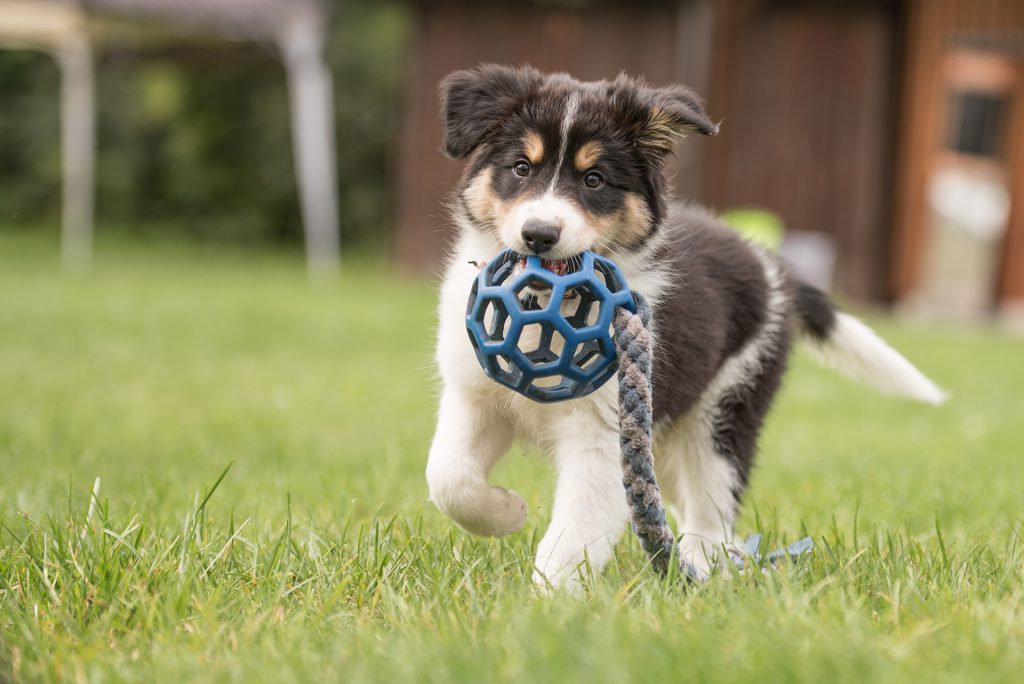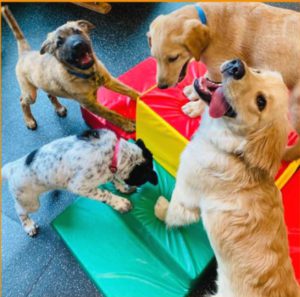Expert guidance from the Humane Society of Boulder Valley
Bringing your new puppy home: expert training, behavior and wellness tips
Bringing a new puppy into your home is such a thrilling, possibility-filled time. Whether you’ve been planning for the arrival of your new family member for some time, or you unexpectedly fell in love with a pup (that’s easy to do, right?!) – we hope these resources will help to set you, your family and your new puppy up with tools for success!
Socialization and why it matters:
Many of us think of puppy playtime with other dogs as the definition of puppy socialization. Although experience interacting with other puppies is critically important for healthy development (more on this later!) there’s a lot more to socialization, and it’s important to know how to do it in a way that helps increase the chances that that your pup can reach their full potential.
In addition to puppy playtime, socialization also includes the systematic process of helping our puppies learn that new things and experiences in life, at home and out-and-about, are safe and good and “no big deal”. To determine your priorities, think about what types of things you’d like to be able to do with your dog as they mature. If you’re a camper, they’d probably have more fun if they feel comfortable with tents, fires, headlamps and big backpacks. If you’re a social butterfly, you’ll want your dog to feel comfortable with new people, and hearing folks knocking on the door. Think surfaces, sounds, veterinary preparation, bathing and grooming, diversity in age, gender and ethnicity of people they are meeting. Most importantly, think of the quality of their experience. The most important part of socialization is to make sure that your puppy is ALWAYS having a positive or neutral experience.
Trainers and behavior consultants talk so much about socialization because it is a developmental period during which puppies are better able to absorb experiences. Often experiences between the ages of 8-16 weeks make a lasting impression – our goal is to help you to make them good ones! Once the critical window for socialization closes, teaching your puppy to feel confident and safe in the world becomes much more challenging and progress can be slow and limited. Please note, this doesn’t mean that you should give up hope if your puppy is over 16 weeks of age or that they can’t learn or make progress past this period, it just means that you will be playing “catch-up” and possibly having to work against negative experiences.
While it is important to spend time focusing on manners, potty training, and other basic life skills while your puppy is young, keep in mind that they have their entire lives to master these skills, whereas the socialization window is a finite time period and therefore socialization should be prioritized above all else while the puppy is under 16 weeks of age. From 8-16 weeks, teaching your puppy to feel safe and confident in the world is the most important thing.

Play biting: why it’s important and why you should allow some
Your puppy needs to learn that human skin is fragile and can’t be treated as roughly as a fur coat. Let your puppy play-bite you every now and again so you can let her know which bites are too hard. Otherwise she won’t learn to inhibit her bite and, if she ever bites a person or dog when upset, she may cause serious injury.
Rule of thumb: From 6-18 weeks of age, allow your puppy to bite when playing as long as it is not too hard.
How to teach your puppy to bite more softly:
- Hard bites should result in a time-out. Stop play, and leave your puppy alone or put
her in a time-out area for one minute. - Each week ask your puppy to bite a little softer by timing her out for her hardest bites.
- Don’t phase out play biting all together until your puppy is reliably biting softly. Then, you can re -direct her to toys or time her out for all bites.
Rate how hard your puppy bites:
For one week, time your puppy out if they give you a level 5 bite. The following week, time out anything that is a 4 or above. Continue this process until your puppy consistently delivers only level 1 bites.
- (Kids and dogs) Liam J Perk Foundation – Cape Coral, Florida
- (Kids and dogs) Home – Family Paws Parent Education
- Steps for a successful dog-to-dog introduction.
- Steps for a successful dog-to- cat introduction – coming soon!
Speaking (or rather seeing) their language:
The main ways dogs communicate are body language and vocalization – in both low-key and obvious ways. Dogs might not be able to talk to us (we wish!), but they are excellent communicators and great listeners. Our dog’s people-skills help them learn new tricks, understand our “rules,” master incredible jobs like service and police work, and provide us emotional connections and bonds. Learn how we humans can learn what our dogs might be “saying” to us.
Body language
Signs that indicate a dog is worried or not comfortable with the interaction include:
- Growling
- Lunging
- Hair standing up
- Trembling
- Baring teeth
- Stiff body
- Prolonged staring
- Avoidance/hiding
- Ears pinned back
- A tucked tail
- Moving away from someone or something
- No interest in high-value treats
Why force-free, reward-based training for HSBV?
Research has shown time and time again that the use of reward-based, force-free strategies to train animals are just as effective as any other method, are more humane (and fun!) and less likely to create negative fallout or damage to the relationship. Read more about the science of building trust in your training.
Positive, force-free training does not use:
- Fear, intimidation, or coercion.
- Pain or pressure.
- Shock, choke, pinch, or prong collars.
- Hitting, yelling, throwing, or shaking things (like penny cans) at the learner.
Positive, force-free training is:
- Humane and based on rewards, respect, and choice.
- Empowerment through managing the learning environment.
- A reciprocal conversation between the teacher and the learner. The learner is allowed to say “no,” “not right now,” “ I can’t,” or “I’m overwhelmed.”
- Productive + science-based — we get results!
- Fun for all ALL participants — trainers and learners!
Other important resources for your new puppy:
Potty Training:
-
- Book: Way to Go! How to Housetrain a Dog of Any Age.
- Article: How to Potty Train A Dog.

Classes, consultations and other support available at HSBV:
- Puppy Club: Puppy Club is a comprehensive program designed to proactively assist families to systematically socialize, normalize and problem solve as their pups mature. Your puppy’s session will include 5-6 classmates with opportunities to recreate with other pups, begin life-skills, and begin positive exposure to a variety of novel stimuli, on campus. Considered a behavioral vaccination, these robust and scientifically supported early socialization efforts, when done well, best prepare both puppies and their guardians for a lifetime of resilience and comfort.
- One-on-One Consultations:
- Puppy Prep School Group Classes: For puppies 8-16 weeks of age. A balance of learning and socialization is offered in this 5-week series class. We will help build skills such as sit, lay down, coming when called, problem prevention and other important accomplishments for a lifetime. Your pup will enjoy a little playtime with other puppies, too!
- Puppy Grad School Group Classes: This fun, 4-week series class is appropriate for 4-6 month aged puppies to advance the skills they learned in Puppy Prep School. Distractions, duration and distance will be added.
Satisfaction Guaranteed Adoption Policy
All adoptions from the Humane Society of Boulder Valley (HSBV) have a satisfaction guaranteed. If you decide that your adopted pet is not the right fit due to behavior concerns, medical issues or lifestyle, you may return your pet to HSBV at any time. If you are considering returning your adopted dog due to behavior concerns, please call our Training and Behavior team at 303-442-4030 ext. 368.
Safety Net Services
HSBV’s Safety Net services support and foster loving relationships between pets and people and seek to prevent relinquishment when possible. Learn more, or apply for safety net support from HSBV.

